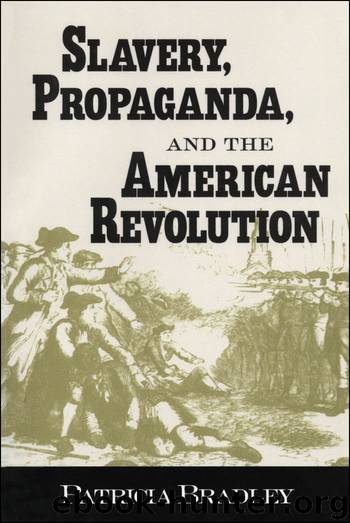Slavery, Propaganda, and the American Revolution by Patricia Bradley

Author:Patricia Bradley
Language: eng
Format: epub
Publisher: University Press of Mississippi
Published: 1998-03-13T16:00:00+00:00
CHAPTER SIX
Shame and Guilt in the Garden of the Innocent
James Otis may be said to have ushered in the antislavery debate of the revolutionary period in his 1764 pamphlet that clearly put antislavery on the radical agenda. Otis’s example was followed in 1767 when a Bostonian Son of Liberty, Nathaniel Appleton, sought to anchor the antislavery debate amid the wave of early patriot successes. “The years 1765 and 1766 will be ever memorable for the glorious stand which America has made for her liberties; how much glory will it add to use if at the same time we are establishing Liberty for ourselves and children, we show the same regard to all mankind that came among us?” (Appleton 2).
From this unctuous and flattering beginning, Nathaniel Appleton eschewed religious argument to make a place for antislavery along economic and practical lines: the slave trade only enriched its traders while preventing the white immigration that would serve to settle the continent; always expecting the slave to “throw off his burden” by revolt, the institution kept communities in constant fear; work taken over by slaves served to prevent white servants from similar work because they would not do work they associated with slavery. In an argument that offered an alternative to the religious discourse that dominated the issue, Appleton even suggested the institution promoted prostitution among lower-class girls because slaves took over the work that such girls could perform.
Appleton was a man of influence in Boston’s revolutionary circles (although not to be confused with the earlier Congregational minister of the same name), a Harvard graduate (admitted as fourth in social standing of his class), son of a Congregational minister, and eventually a successful merchant and candle manufacturer (Sibley’s 12:354–59). His position in the movement is suggested by the pamphlet publication of the essay by Edes and Gill, although it did not appear in the Gazette. The essay was undoubtedly prompted by Massachusetts’s increasing antislavery activities. In 1765 and 1766, Worcester, then Boston, instructed their representatives to seek legislation to end slavery. In 1767, a vigorous effort was made in the Massachusetts House of Representatives to restrict the importation of slaves, and Appleton’s essay, calling on the patriot fervor engendered by repudiation of the Stamp Act, was part of efforts to push the issue. As noted earlier, after much maneuvering, the antislavery bill was simply lost, disappearing suddenly and silently when legal maneuvers to kill it were exhausted (G. Moore 126–28). Appleton remained an active patriot but wrote no more antislavery essays.
Unlike Appleton’s pamphlet, the 1770 election sermon by Samuel Cooke, New Divinity pastor of Cambridge’s Second Church, was published as both a pamphlet and a newspaper insertion (MS 7/29/73). Appleton had made no excuses for American slavery, but Cooke, in the section addressing slavery, put the slave trade at British feet and was undoubtedly intended to embarrass Governor Thomas Hutchinson. Cooke’s conclusion, however, served to separate the issue from the patriots by calling upon issues of conscience: “Ethiopia has long stretched out her hands to us.
Download
This site does not store any files on its server. We only index and link to content provided by other sites. Please contact the content providers to delete copyright contents if any and email us, we'll remove relevant links or contents immediately.
| General | Discrimination & Racism |
Nudge - Improving Decisions about Health, Wealth, and Happiness by Thaler Sunstein(7707)
The Fire Next Time by James Baldwin(5446)
iGen by Jean M. Twenge(5416)
Adulting by Kelly Williams Brown(4574)
The Sports Rules Book by Human Kinetics(4388)
The Hacking of the American Mind by Robert H. Lustig(4383)
The Ethical Slut by Janet W. Hardy(4253)
Captivate by Vanessa Van Edwards(3840)
Mummy Knew by Lisa James(3693)
In a Sunburned Country by Bill Bryson(3542)
The Worm at the Core by Sheldon Solomon(3487)
Ants Among Elephants by Sujatha Gidla(3467)
The 48 laws of power by Robert Greene & Joost Elffers(3291)
Suicide: A Study in Sociology by Emile Durkheim(3023)
The Slow Fix: Solve Problems, Work Smarter, and Live Better In a World Addicted to Speed by Carl Honore(3009)
The Tipping Point by Malcolm Gladwell(2925)
Humans of New York by Brandon Stanton(2873)
Get What's Yours for Medicare: Maximize Your Coverage, Minimize Your Costs by Philip Moeller(2736)
Handbook of Forensic Sociology and Psychology by Stephen J. Morewitz & Mark L. Goldstein(2705)
